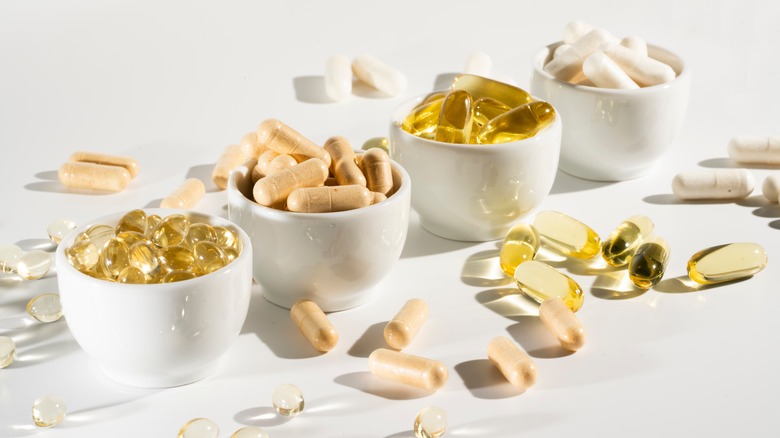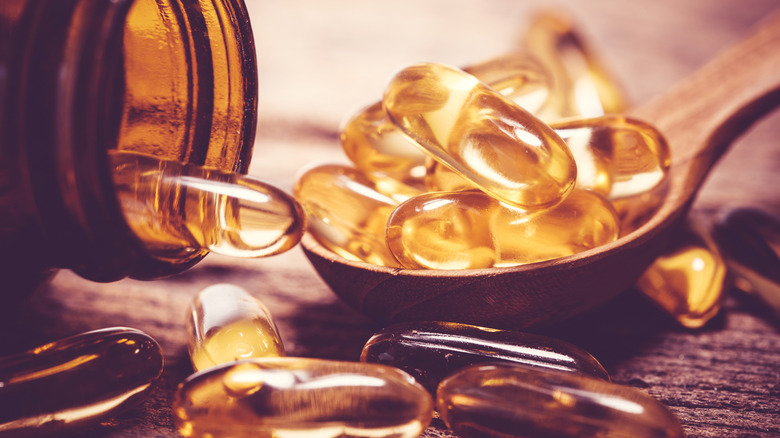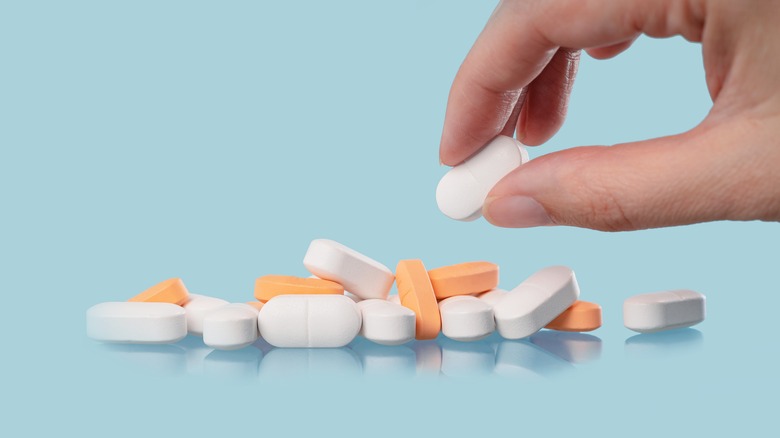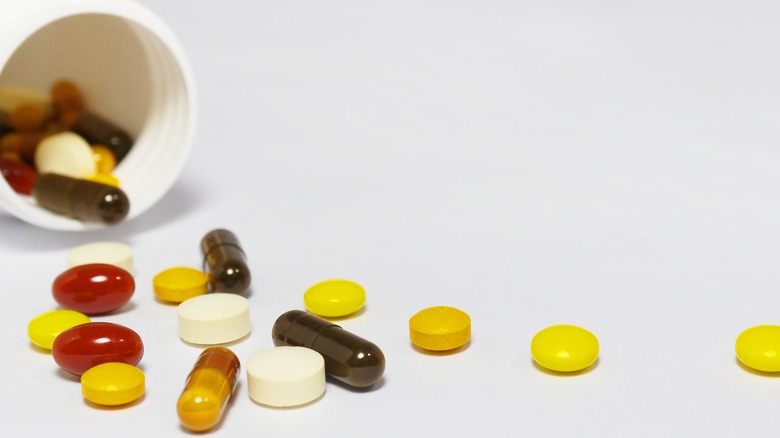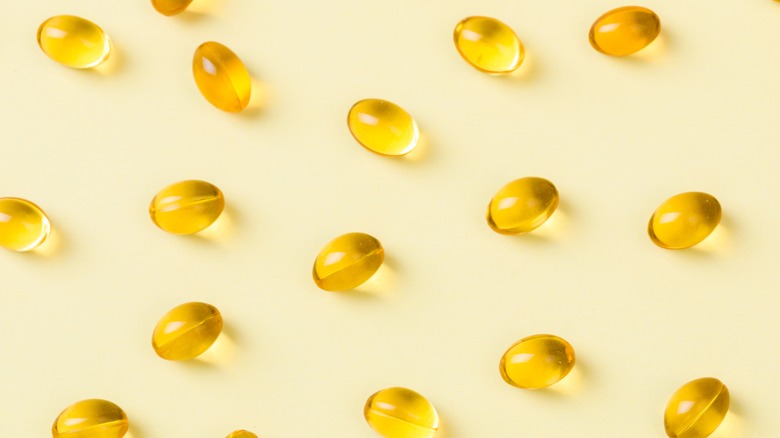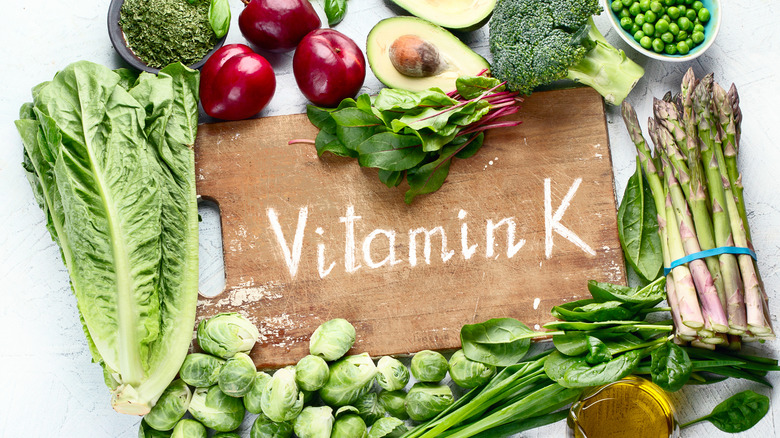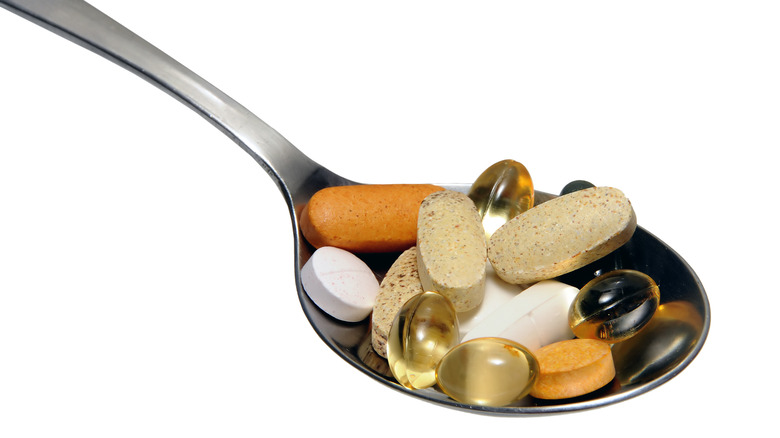What Happens If You Take Too Much Of These Vitamins And Minerals
While plenty of individuals choose to take various vitamins and minerals in supplement form, it's crucial to watch your intake when it comes to consumption. As noted by WebMD, it's important to get nutrients in your diet, but taking too many vitamins and minerals isn't healthy — in fact, it can have the opposite effect than what's intended. For example, routinely consuming too much vitamin C or zinc can lead to minor upsets like nausea, diarrhea, or even stomach cramps. Though those symptoms might sound fairly minor, these aren't the only side effects that can occur.
For instance, if you consume too much selenium, you could experience hair loss, gastrointestinal issues, exhaustion, and even mild nerve damage, per WebMD. While taking supplements might seem like a good idea, overdoing it is never beneficial. "There's no real advantage to taking more than the recommended amounts of vitamins and minerals," said Johanna Dwyer, RD. She added that when taking supplements, you shouldn't ingest more than the daily recommended value. With a large variety of vitamins and minerals available in convenient capsules, it's important to know what might happen if you take too much of a specific supplement.
Vitamin D can be toxic in large doses
As stated by VeryWellMind, vitamin D is an essential nutrient that's key to keeping your body running smoothly and is vital for the immune system, nervous system, and muscles. However, despite its obvious benefits, approximately 40% of Americans could be deficient in this vitamin. Likewise, a deficiency in vitamin D is nothing to scoff at, as it has been linked to health issues such as depression and seasonal affective disorder (SAD). Due to this concern, the outlet noted that many individuals could benefit from taking a vitamin D supplement or making dietary changes. Still, while vitamin D remains important, it is possible to consume too much.
The daily recommended vitamin D dose is 600 IU per day for adults under 70 and 800 IU for adults over 70. However, you can likely consume anywhere from 4,000 to 10,000 IU daily without repercussions. Still, according to Healthline, vitamin D toxicity can happen. However, it's more likely to affect those with specific medical conditions like granulomatous disorders, congenital disorders, and some types of lymphomas. Likewise, toxicity is most common in cases of accidental overdose, prescription errors, and misuse of high-dose supplements.
Those concerned about consuming too much vitamin D should check for elevated blood levels, elevated blood calcium levels, a change in mental health status, and kidney problems. Gastrointestinal issues can also occur, with symptoms like nausea, vomiting, constipation, diarrhea, or lack of appetite, per Healthline.
Too much calcium can lead to hypercalcemia
As noted by WebMD, calcium is an essential nutrient for the body, helping to nourish and strengthen our bones and teeth. Getting enough of this mineral throughout a lifetime is as crucial for growing bodies as it is for older individuals. Also, calcium is vital for maintaining various body functions such as nerve signal transmission, hormone release, blood vessel function, and muscle contraction. The amount of calcium a person needs varies based on one's age. For example, younger individuals ages 1 to 3 only need about 700 mg, while those between 9 and 18 should get around 1,300 mg. On the other hand, those between the ages of 19 to 50 should stick with 1,000 mg.
Regardless of age, it is possible to consume too much calcium. According to Healthline, this can lead to hypercalcemia (high calcium concentration in the blood). Likewise, this condition can become a serious problem, and if you have extremely high levels of calcium in your body, it can be life-threatening. Some signs you'll want to look out for are headaches and fatigue, as well as kidney issues. Problems related to the latter include excessive thirst, excessive urination, and pain associated with kidney stones. Calcium levels can also affect your muscles and, in the wrong dose, can lead to twitches, cramps, and weakness. If you have any concerns about your calcium intake, you should consult with a medical professional.
High doses of zinc can make you feel sick
As stated by GoodRx Health, zinc is an important mineral that plays many roles in maintaining a healthy body. It works to support the immune system, metabolism, and skin health. Similarly, it can also help with wound healing, fighting off infections, and the senses of taste and smell. While most individuals likely get enough zinc through food, many people also consume additional zinc in other forms such as pills, lozenges, nasal sprays, and gels. Zinc can also be found in many multivitamin products, cough and cold medicines, and homeopathic products. Additionally, it's noted by the informational source that the recommended amount of zinc for individuals varies depending on age.
Similar to many other supplements, it is possible to consume too much zinc. According to Mather Hospital, excessive zinc supplements can be dangerous and even lead to copper deficiency, which can cause numbness and weakness in the arms and legs in addition to other serious neurological problems.
Likewise, Healthline says that accidental zinc poisoning can be caused by ingesting too many dietary supplements, multivitamins, or household products containing zinc. If you're worried that you might have consumed too much zinc, look for common signs and symptoms of overdose. Some examples include nausea, vomiting, stomach pain, diarrhea, flu-like symptoms, changes in your sense of taste, and frequent infections.
Large amounts of vitamin A can lead to serious health issues
As reported by Healthline, vitamin A is an important nutrient that plays a key role in maintaining a healthy body. This group of fat-soluble compounds contains essential substances like retinol, retinal, and retinyl esters. Also, two forms of this type of vitamin (retinol and retinyl esters) can be found in food sources like dairy, liver, fish, fruits, vegetables, and oils. Additionally, it's noted that vitamin A is fat-soluble, which means that it stores itself in body tissue for later use. So what is vitamin A good for? Well, it assists with things like cell growth, immune function, fetal development, and vision. It can also help with surface tissue concerns that involve your skin, intestines, lungs, bladder, and inner ears.
Still, despite its awesome benefits, toxicity can occur with vitamin A. According to the outlet, the recommended amount of this supplement is 900 mcg for men and 700 mcg for women. Likewise, most individuals can reach this recommended dose through food. However, due to being a fat-soluble vitamin, vitamin A can reach unhealthy levels over a period of time. You also don't want to consume high doses (more than 3,000 mcg) per day as that can lead to serious health concerns and even be fatal. Things you'll want to watch out for with vitamin A toxicity are vision changes, joint and bone pain, lack of appetite, nausea, vomiting, hair loss, sun sensitivity, dry skin, headache, confusion, or itchy skin.
Too much vitamin E can lead to toxicity
As stated by Insider, vitamin E is a crucial vitamin that benefits the body in numerous ways, such as expanding blood vessels and preventing blood clots. You can get vitamin E from food sources like sunflower seeds, nuts, and even vegetable oils. According to the write-up, via the National Institutes of Health, the daily recommended dose of this vitamin varies based on age. While younger individuals need less, the recommended amount significantly increases with age. The upper limit of what's considered safe vitamin E intake for adults is 1,100 mg daily.
This nutrient is also a fat-soluble vitamin, which means levels can build up in the body over time. This means vitamin E toxicity can happen, most commonly due to unneeded or excessive supplement use. Bansari Acharya, RDN (registered dietitian-nutritionist), said, "If you are taking a vitamin E supplement [and] you don't have a deficiency of vitamin E, high levels can build up in the body and cause toxicity" (per Insider). Additionally, it's stated that vitamin E toxicity has two stages of symptoms: mild and severe. Acharya says that lesser side effects can affect those who constantly take high doses of vitamin E. For mild symptoms, watch out for nausea, headache, diarrhea, abdominal cramps, and fatigue. Serious and potentially dangerous symptoms (which can occur within a few days of taking high doses of vitamin E) include excessive bleeding and hemorrhagic stroke.
Vitamin K toxicity is rare, but can happen
As reported by WebMD, vitamin K is another essential vitamin that helps keep the body running smoothly. This vital nutrient assists with bone building and blood clotting. Some individuals also ingest it to help with diabetes, osteoporosis, athletic performance, and even breast cancer, though these latter uses aren't strongly backed by scientific evidence. Although you can get vitamin K from green vegetables like broccoli and brussels sprouts, many people also take it in supplement form. It's recommended that men over 19 consume about 120 mcg daily, while women over 19 should get approximately 90 mcg per day. While most forms of vitamin K are safe to consume, it's possible to experience some side effects.
According to the Mayo Clinic, side effects are uncommon, but can happen. If you're worried about your vitamin K intake, watch out for these symptoms: lack of appetite, a decrease in movement or activity, trouble breathing, body swelling, irritability, muscle stiffness, an enlarged liver, paleness, and yellow eyes or skin. Additionally, some individuals can experience more severe symptoms, although those cases are extremely rare. These unlikely symptoms include problems swallowing, irregular breathing, fainting, skin rashes or hives, tightness in the chest, and swelling in the eyelids, face, or lips. Other rare symptoms include blue coloring, flushing, or redness of the skin; dizziness; an increased or decreased heartbeat; and increased sweating.
Too much copper can hurt your liver
According to the National Institutes of Health (NIH), copper is a mineral that everyone needs to stay healthy. The body uses copper to assist with essential functions such as creating energy, connective tissues, and blood vessels. Copper is also necessary for maintaining the nervous and immune systems, developing the brain, and even activating genes. You can get copper from a wide variety of food sources, such as beef liver, oysters, cashews, sunflower seeds, chocolate, wheat-bran cereals, whole grain products, potatoes, mushrooms, avocados, chickpeas, and even tofu, per NIH. However, copper can also be consumed as a dietary supplement.
The amount of copper a person needs varies based on age, increasing you get older. For example, babies only need 200 mcg, while teens between 14 to 18 years old should get 890 mcg. Adults over 19 years old need 900 mcg, while breastfeeding teens and women should consume 1,000 mcg. Still, according to the outlet, large amounts of copper can be harmful to your health.
WebMD says that those concerned about copper toxicity should watch out for nausea, vomiting, diarrhea, fever or chills, muscular weakness, pain or burning around the abdominal area, a lack of urine, yellowing of the eyes and skin, or a metallic taste in the mouth.
Excessive iron can lead to serious health issues
According to the National Institutes of Health (NIH), iron is an essential mineral that is crucial for the human body's growth and development. Our bodies use this vital mineral to make a protein found in red blood cells called hemoglobin, which carries oxygen from the lungs to all other body parts. Iron also helps our bodies make another important protein called myoglobin, which helps to deliver oxygen to our muscles. This mineral is also essential to hormone production.
The NIH stated that the amount of iron an individual needs varies depending on a person's age, sex, and diet. Vegetarians need almost twice the amount of iron as those who consume meat products.
Teen boys between the ages of 14 to 18 should consume around 11 mg of iron, while teen girls of the same ages should be getting 15 mg. Similarly, while adult men between 19 to 50 years old should get 8 mg of iron, adult women of the same age need 18 mg. Be careful with your iron intake, as there are side effects from consuming too much. Healthline stated that large amounts of iron could lead to serious health problems and could even be toxic. Some examples of these side effects include iron poisoning, hereditary hemochromatosis (a genetic disorder), and African iron overload (which results from high levels of iron in a person's diet).
Overdoing vitamin C can upset your stomach
As noted by the Mayo Clinic, vitamin C is an important nutrient that is vital to our bodies. It supports growth and development, in addition to assisting the body with iron absorption. Consuming this water-soluble vitamin is essential because our bodies don't make or store vitamin C on their own. It can be found in a variety of food sources, such as oranges, red peppers, strawberries, and even broccoli. Most individuals are able to get the recommended daily amount (75 mg for women and 90 mg for men) through food. Additionally, the informational source stated that the upper limit of safe consumption is 2,000 mg daily.
Still, while vitamin C is typically harmless, high doses of this nutrient through supplements can lead to some unwanted side effects. For example, large amounts of vitamin C could potentially cause diarrhea, nausea, vomiting, heartburn, stomach cramps, or even headaches, per the Mayo Clinic. Also, according to MedicalNewsToday, some people can experience severe health issues that include kidney stones, nutrient imbalances, and even painful bone spurs. Although these types of severe side effects aren't common, it's a good idea to keep an eye on your vitamin C intake.
Too much folic acid can lead to serious health issues
As stated by OASH (the Office on Women's Health), folic acid (a manufactured form of folate, a B vitamin) is an essential nutrient that everyone needs to maintain a healthy body. Folic acid, as well as folate, assists the body with making new red blood cells. Likewise, this nutrient is extremely important for those looking to get pregnant or are already pregnant. That's because folic acid protects fetuses against potential serious birth defects. Those worried about their intake of this B vitamin should know that folic acid is found in food sources such as bread, pasta, and cereal; folate is also derived from leafy green vegetables, oranges, and beans.
On the other hand, OASH stated that too much folic acid isn't good for our bodies. You shouldn't consume more than 1,000 micrograms of folic acid a day unless directed otherwise by a medical professional. Additionally, it's noted that too much of this nutrient can hide signs that you're deficient in vitamin B12, which could potentially lead to nerve damage. Similarly, Healthline declared that there are three other possible side effects that can result from too much folic acid. These include an accelerated age-related mental decline, a slowdown of brain development in children, and an increased chance of cancer recurring in those with cancerous cells.
Too much selenium can cause liver, kidney, and heart problems
Selenium is another vital nutrient, as stated by the National Institutes of Health. It's critical to the health and function of the thyroid glands, reproductive system, and DNA production. Selenium also helps safeguard the body from damage caused by things like infections and free radicals.
According to WebMD, one of the noteworthy benefits of selenium is its antioxidant properties. Still, the outlet noted that people only need small amounts of selenium in order to reap its benefits, and most people can get their daily dose from food.
The recommended daily amount for individuals varies based on age. For example, children between the ages of 9 to 13 should get 40 mg per day, while children 14 and up and adults should get 55 mg per day, per WebMD. Pregnant and breastfeeding women should get a slightly higher dose, with the former getting 60 mg and the latter needing 70mg. The highest amount of selenium that can be safely consumed is 400 mg daily for adults, with anything more than that considered unsafe. While selenium doesn't typically involve side effects, too much of it can cause liver, kidney, and heart issues in addition to other symptoms. Likewise, seriously high doses can lead to death, and those at high risk for skin cancer should not take these supplements.
You can get too many nutrients from a multivitamin
Many people consume daily multivitamins to get all their nutrients in one convenient capsule. Still, Pharmacy Times noted that the amount of vitamins and minerals in multivitamins might be too much for the body. While the outlet stated that our bodies adapt when taking these vitamins by consuming what's needed and excreting the rest through urine, that doesn't mean an unnecessary intake of various nutrients and minerals is safe. For example, some water-soluble vitamins found in multivitamins like B6 can cause nerve damage, while too much vitamin C can cause kidney stones. The same goes for fat-soluble vitamins like A, D, E, and K, all of which can reach dangerous levels in the body over time.
Likewise, according to Mount Sinai, any ingredients found in a multivitamin supplement can be toxic in large amounts. The nutrients that come with the most serious side effects are iron and calcium. Those worried about a multivitamin overdose should look out for symptoms like vomiting, diarrhea, weakness, an irregular heartbeat, dizziness, and blurry vision.
Additionally, The Checkup noted that gummy vitamins aren't immune from possible complications. Though they might taste more like a treat than a vitamin, that doesn't mean you can't overconsume these tasty supplements. As with a standard multivitamin overdose, excessive levels of nutrients from a gummy vitamin can lead to gastrointestinal issues as well as headache, rash, nausea, and even more severe side effects.
